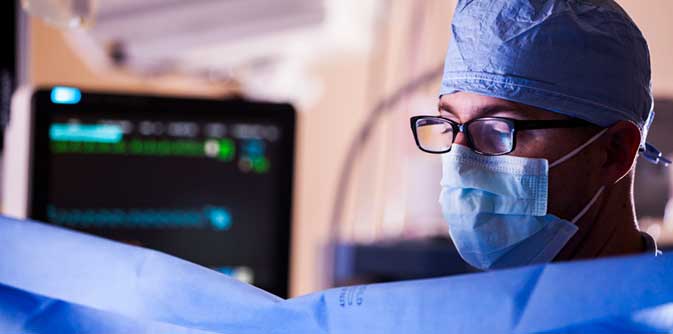Skull Base Surgery
Achieve the best health outcome for your skull surgery at UNM Health. Our team of specialists has the experience and expertise needed to treat this delicate and complex area.
What is the Skull Base?
The skull base is made up of several bones that separate your brain from the rest of the structures in your head, including your eyes, ears and sinuses. It includes a large opening for your spinal cord and many small openings for nerves and blood vessels.
You may require skull base surgery if you have a brain or pituitary tumor, epidermoid cyst or trigeminal neuralgia, among other conditions.
Coordinated, Multidisciplinary Care
We work with you to coordinate schedules so that on a single visit you are meeting with multiple UNM Health specialists. You will receive a comprehensive care plan as conveniently as possible.
Your team of professionals may include:
- Neurosurgeons with advanced training in skull base surgery
- Endocrinologist (specialist in the endocrine system, including the pituitary gland)
- Ophthalmologist (eye doctor)
- Otolaryngologist (ear, nose and throat specialist)
Your health team always opts for the least invasive treatment possible. Your surgeon may use a surgical approach such as:
- Stereotactic radiosurgery, which destroys cells using focused beams of high dose radiation
- Endoscopic skull base surgery, which removes tumors and lesions through the nose and sinuses
Make an Appointment
To schedule an appointment, call 505-272-4866.
UNM Health Areas of Expertise
Amyotrophic lateral sclerosis (ALS, or Lou Gehrig’s disease), is a disease of the nerve cells in the brain and spinal cord that control voluntary muscle movement. ALS is characterized by muscle spasticity and rapidly progressive weakness due to muscle wasting. This results in difficulty speaking, swallowing and breathing.
An electromyogram (EMG) measures the electrical activity of muscles at rest and during contraction. Nerve conduction studies (NCS) measure how well and how fast the nerves can send electrical signals.
Nerves control the muscles in the body with electrical signals called impulses. These impulses make the muscles react in specific ways. Nerve and muscle problems cause the muscles to react in abnormal ways.
UNM Health uses magnetoencephalography (MEG), which is a functional neuroimaging technique for mapping brain activity by recording magnetic fields produced by electrical currents occurring naturally in the brain. This is done using very sensitive magnetometers, to precisely located brain tissue that causes seizures.
Neurology deals with the diagnosis and treatment of all categories of conditions and disease involving the central and peripheral nervous system and its subdivisions (the autonomic nervous system and the somatic nervous system). This includes their coverings, blood vessels and all effector tissue, such as muscle.
We assess and treat complex headache conditions. Typically, our patients come to use after already having been unsuccessfully treated with at least two prophylactic agents and receiving other extensive treatment from other neurologists or primary care clinicians.
Huntington's disease is a neurodegenerative genetic disorder that affects muscle coordination and leads to cognitive decline and behavioral symptoms. At our Huntington's Disease Clinic, neurologists, psychiatrists, physical, occupational and speech therapists, and a social worker are available to consult with and provide care for you.
We asses and treat patients with disorders such as Alzheimer’s Disease and other dementias including neuropsychometric evaluation. Our Memory and Aging Center is home to New Mexico's top experts in dementia, who provide comprehensive services that can enhance your quality of life.
At UNM Health, receive comprehensive care of movement disorders, including Parkinson’s disease, essential tremor, dystonia, tics and ataxia. Here, you will have access to a range of experts, such as neurologists who specialize in movement disorders, sleep specialists, psychiatrists, physical therapists and speech therapists.
Muscular dystrophy is characterized by progressive skeletal muscle weakness, defects in muscle proteins, and the death of muscle cells and tissue.
At UNM Health, we work with you to assess and treat a wide array of neuromuscular disorders, including carpal tunnel syndrome, neuropathy, radiculopathy, muscle disease and myasthenia gravis.
Oculopharyngeal muscular dystrophy is a genetic condition characterized by muscle weakness that begins in adulthood, typically after age 40.
Pediatric neurology deals with the diagnosis and treatment of all categories of conditions and disease involving the central and peripheral nervous system and its subdivisions (the autonomic nervous system and the somatic nervous system). This includes their coverings, blood vessels and all effector tissue, such as muscle.
Peripheral neuropathy is damage to the peripheral nervous system, the vast communications network that transmits information from the brain and spinal cord (the central nervous system) to every other part of the body.
A stroke happens when blood flow to a part of the brain stops. If blood flow is stopped for longer than a few seconds, the brain can’t get blood and oxygen. Brain cells can die, causing permanent damage.
UNM Health Primary Stroke Care Center is a regional referral center for comprehensive, advanced care. As the home of the state's most sophisticated Stroke & Cerebrovascular Outpatient Program, you will receive timely and specialized care in our clinics.
Sleep disorders include problems with sleeping, including trouble falling or staying asleep, falling asleep at the wrong times, too much sleep or abnormal behaviors during sleep.
At UNM Health’s Program in Sleep Medicine, we provide comprehensive services when you’re having symptoms during sleep or while awake due to non-refreshing sleep. Our team is dedicated to the diagnosis and treatment of sleep/wake disorders in adults and children using a state-of-the-art outpatient sleep laboratory, an inpatient sleep laboratory and a sleep medicine clinic.

